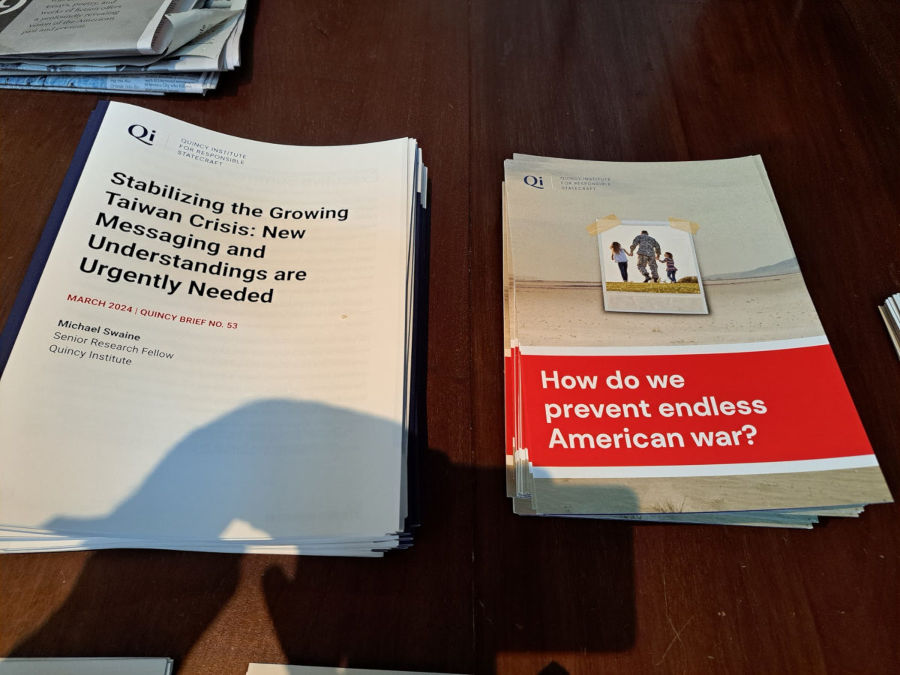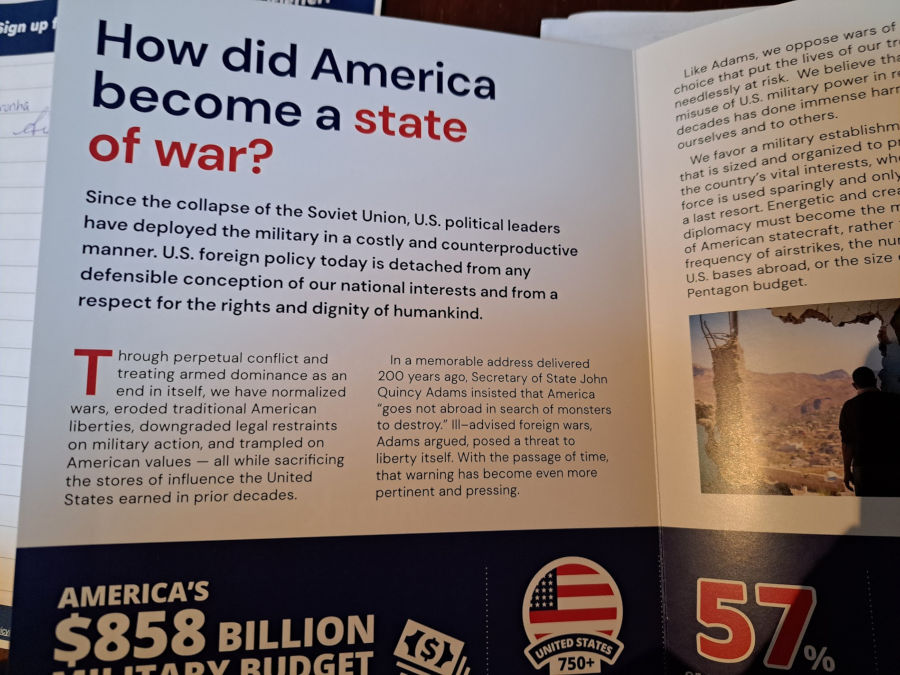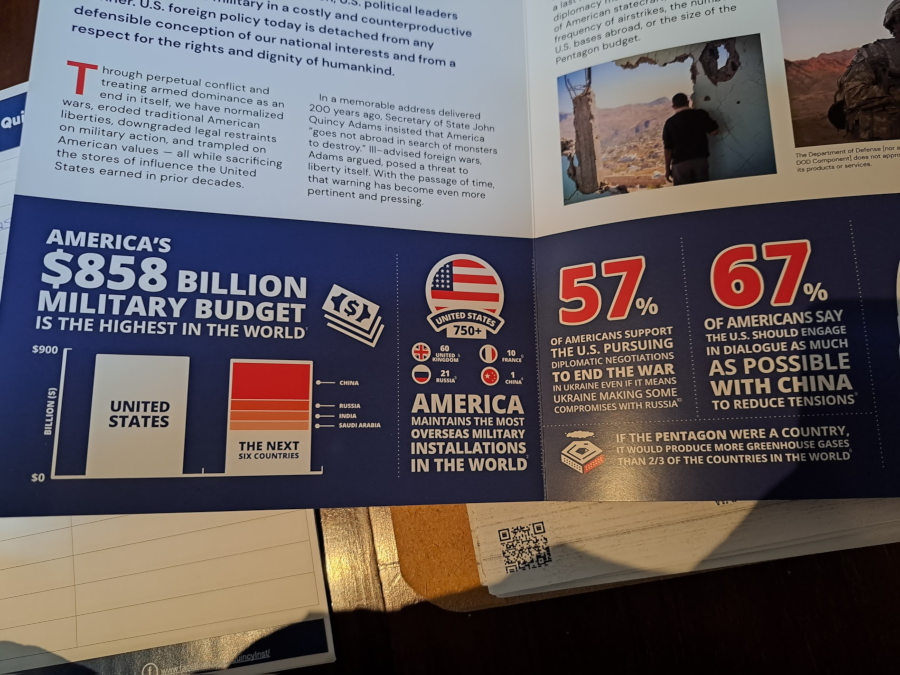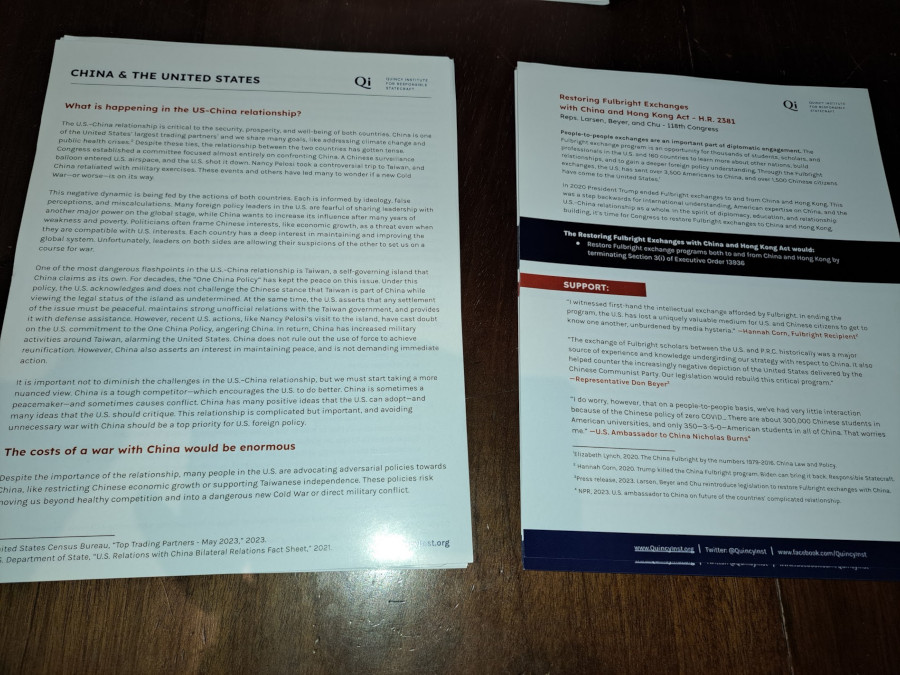Seattle panel discussion on preventing war with China
by Donald A. Smith, PhD
On Thursday, March 21, 2024, I attended a panel discussion in Seattle: "Can China & the US Avoid War?" (Stabilizing US-China relations before a "near miss" turns into a crisis), organized by the Quincy Institute for Responsible Statecraft and Washington Physicians for Social Responsibility (WPSR).
The panelists were Michael Swaine, an analyst with the Quincy Institute for Responsible Statecraft; Tasha Essen, of Korea Peace Now; and Sean Arent, Nuclear Weapons Abolition Program Manager of WPSR.
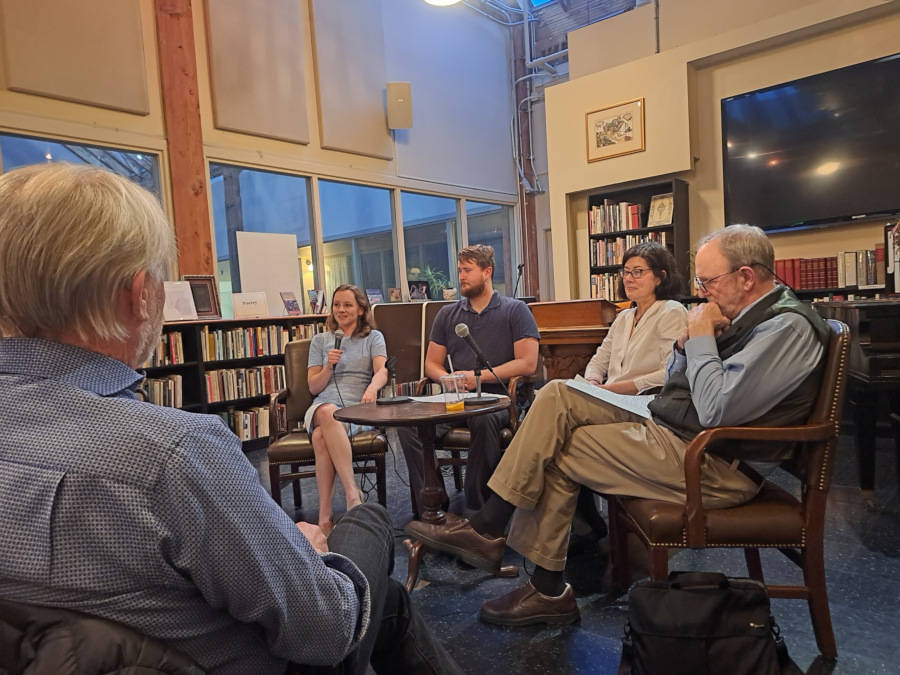
From the left: the moderator (Tori Batemen of QI), Sean Arent, Tasha Essen, and Michael Swaine.
Here is a link to a video of the discussion (warning: the sound quality is low).
Much of the discussion concerned the risk that the conflict over Taiwan escalates into a full-blown nuclear war between the U.S. and China -- something that everyone thinks would be disastrous for the entire world. Despite the obvious costs and risks of such a conflict, the U.S. and China have so far been unable to defuse the situation. Indeed, in some quarters in the U.S. there has been open talk of upcoming war with China. For example, see NBC News' Air Force general predicts war with China in 2025, tells officers to prep by firing 'a clip' at a target, and 'aim for the head'; when that general's remarks were mentioned at the panel discussion, Sean Arent said that he thought the general should be fired for saying that.
Michael Swaine led off the discussion by discussing the history of U.S.-China relations. The U.S. didn't care about Taiwan until the Korean War. While Swaine wouldn't say that the U.S. and China are headed towards war, he does acknowledge that tensions are escalating because of the U.S. desire to prevent China from taking over Taiwan and because of the nationalistic desire of Chinese to protect their borders. Both sides have staked their reputations on coming out on top of this conflict. Swaine says China might be willing to use force to stop the U.S. from further arming China, even at the risk of losing an initial battle.
It is generally agreed that the U.S. Navy is superior to China's. If China faced a humiliating defeat, would it feel pressured into using tactical nuclear weapons? But China has promised not to use nuclear weapons first and only to use them in response to their prior use by an adversary. The U.S. has made no such a no-first-use promise, as Sean Arent pointed out. Yet China is in the process of doubling their nuclear arsensal, and has "just" 400 warheads, compared to 5000 in the U.S.
Swaine said that President Eisenhower threatened China in 1958 with the use of nuclear weapons during the Taiwan Strait crisis. Swaine said that the Chinese remember that incident very clearly and want to make sure the U.S. can't intimidate them with nuclear weapons; hence China's nuclear weapons expansion.
Though the U.S. Navy is bigger, China has high tech weaponry, including anti-ship missiles, and has the advantage of proxmity. The U.S. lost disastrous wars against third-world countries in Vietnam, Iraq, and Afghanistan, and it's apparently losing its current proxy war with Russia. So trying to wage war against a technologically advanced country four times its population and trying to do so along its enemy's borders seem like the pinncale of hubris and stupidity.
War games (simulations) by the Center for Strategic and International Studies conclude:
In most scenarios, the United States/Taiwan/Japan defeated a conventional amphibious invasion by China and maintained an autonomous Taiwan. However, this defense came at high cost. The United States and its allies lost dozens of ships, hundreds of aircraft, and tens of thousands of servicemembers. Taiwan saw its economy devastated. Further, the high losses damaged the U.S. global position for many years. China also lost heavily, and failure to occupy Taiwan might destabilize Chinese Communist Party rule.
Because Taiwan has technological leadership in semiconductors, the U.S. fears that were China to take over Taiwan, it would threaten U.S. vital interests. Hence the recent CHIPS for America Act signed into law in 2022.
Swaine said that the issue of controlling micro-chip production is secondary and the emphasis should be on preventing conflict. (I'm not sure I understood his point.) In response to my question whether the U.S. might be trying to intentionally provoke China into a war so that it can defeat China before it gets too uppity, Swaine said that many Chinese do believe that this is what the U.S. is trying to do. Swaine himself doesn't believe that civilian U.S. officials have that intention. But many Americans do want to maintain dominance in Asia. Swaine thinks maintaining dominance is not viable. Swaine says that in D.C. the "knee jerk reaction is: security comes from American strength and American strength comes from American dominance." Swaine's QI briefs discuss an alternative policy that prevents war with Asia.
China already has economic and technical leadership in several industries, including mining of rare earths, electric batteries, solar technology, and electric vehicles. It has a large trade surplus with the U.S. While the U.S. spent trillions of dollars on diastrous overseas wars, China was busy building up its infrastructure, industrial base, and education system. China has started acting like a global power, with its Belt and Roads Initiative and its pursuit of extractive industries overseas. The industrial core of the U.S. has been hollowed out and moved to China.
The One China Policy, which the United States agreed to in 1972, acknowledges that there is one China encompassing both mainland China and Taiwan; however, ithe policy leaves room "strategic ambiguity." Quoting wikipedia:
The United States has formal relations with the PRC, recognizes the PRC as the sole legal government of China, and simultaneously maintains its unofficial relations with Taiwan while taking no official position on Taiwanese sovereignty. The US “acknowledges” but does not “endorse” PRC's position over Taiwan, and has considered Taiwan's political status as “undetermined”.For over 50 years that strategic ambiguity held firm, with China not acting to forcefully incorporate Taiwan. But in recent years tensions have risen. The United States has been sending arms to Taiwan, beefing up its security footprint near Taiwan, running freedom-of-navigation exercises, sending high level government delegations to Taiwan (despite angry denunciations from the mainland), allying with China's Pacific neighbors to build a deterence against forced reuinification, staging provocative military exercises, raising tariffs on Chinese goods, trying to restrict exports of sensitive technology, and demonizing China and President Xi. China, in turn, has been claiming islands in the South China Sea and building bases.
Swaine says that completely "decoupling" the U.S. and Chinese economies, as some people suggested, is infeasible. So now they're talking about "de-risking", which involves setting up restrictions for strategically important technologies and goods. Small yard, high fence. For example, high end chips can't be exported. On the other hand, the U.S. wants to minimize dependence on Chinese imports for crucial technology. A big problem is that a lot of technologies are dual-use, and it's hard to determine the line between what should and what shouldn't be allowed. The Chinese too are doing de-risking to limit their dependence on Western sources. Swaine thinks that in the long run, trade restrictions will lead to less innovation and efficiency.
China has said that its patience is not eternal, and sooner or later real reunification must occur. It has not ruled out using force to achieve that.
Questions that came up at the panel discussion include: Is the uptick in U.S. hostility and war-planning towards China a result of the specific threats to U.S. vital interests raised by the prospect of China taking over Taiwan's semiconductor industry? Or is the uptick a result of the broader effort for the U.S. to retain world leadership as defender of the "rules-based international order"? Is the U.S. provoking a war in China, the way some commentators (e.g., here) believe the U.S. intentionally provoked a war in Ukraine via aggressive NATO expansion?
As Swaine writes, if the U.S. builds up a strong military presence near China's borders, with the stated aim of deterring Chinese aggression, that very act may help provoke an aggressive response. (This is similar to what happened in Ukraine, since the U.S. was arming Ukraine since at least 2014, despite Russian protestations.) Swaine recommends that the U.S. desist from antagonizing China via provocative words and deeds, such as promising to come to Taiwan's defense. In the high stakes game of chicken happening now in China, each side doesn't want to lose face by backing down. That risks escalation to a terrible war.
Sean Arent said that China is surrounded by US military bases, and the US military strategy called the "Pivot to Asia" ought to concern them.
Some commentators think that U.S. aggression against China is a symptom of the ongoing demise of the U.S. empire, as it self-destructs due to corruption, political divisions, extreme economic inequality, endless wars, heavy debt, deindustrialization, and an over-extended empire of 750 military bases in approximately 80 countries. A dying animal lashes out recklessly.
It's hard not to suspect that the U.S. plans to fight China militarily because it can't beat China economically. The Chinese economic and top-down political system has brought great prosperity to China, and that is unacceptable to U.S. leaders who want to oversee the world's rules-based order.
Sean Arent discussed agitation in the media and in Congress around things like weather balloons, "spy cranes" and, most infamously, TikTok, which the House voted to ban if it continues to be China-owned. Arent said that such things are increasingly bipartisan. Anti-China rhetoric arond covid-19 was mostly fueled by the far-right.
Senator Rand Paul says TikTok isn't even owned by China. International investors own 60% of TikTok. 20% is owned by Chinese software developers. 20% is owned by the employees, 7,000 of whom are Americans. See Rand Paul Calls Out Fox News Host During Live TV: 'You Just Told a Lie'.
At the panel discussion, Essen reported that racist incidents against Asians have increased dramatically in recent years, both in the U.S. and in Europe. NBC News reported that in 2023 one half of NYC Asian Americans reported some kind of hate (verbal or physical) directed at them due to their race. One fifth of them reported being physically assaulted. Some skilled Chinese engineers have left the country due to the hostility. NBC New reported a 339% rise in reported hate crimes against Asians.
Essen mentioned the Peace & Reconciliation Park in Tacoma which commemorates the violent expulsion of 200 Chinese people in the late 1880s. That's why there's no Chinatown in Tacoma.
An online search shows numerous news articles about Asian hate crimes. For example: Study Shows Rise of Hate Crimes, Violence Against Asian Americans During the Pandemic and 1 in 3 US Asians and Pacific Islanders faced racial abuse this year, AP-NORC/AAPI Data poll shows. Essen speculated that the rise in hate crimes is partly due to the increasing "China Bad" narrative. Former President Trump infamously called the covid-19 virus the "China virus." But, says Essen, while the China Bad narrative was popularized by Trump, it did not originate with him. It's been around for a long time, Trump paved the way for others to publicly display this kind of sentiment. Now, far too many US politicians are using this kind of hateful rhetoric about China.
Sadly and ironically, there are credible reports that the virus may have originated from lab work performed in Wuhan China and partly funded by the U.S. Defense Department. See, for example, Does the US Owe the World for Covid-19?.
Tasha Essen quoted a Gallup poll which said that China was at the top of the list of countries deemed the U.S.'s greatest enemy (China was 41%; Russia was 26%.)
But Swaine pointed out that despite anti-Chinese sentiments, a majority of Americans want to resolve Taiwan by diplomacy. While Americans support defending Taiwan from China in case of an invasion, Americans oppose sending U.S. troops -- which Swaine said would be impossible.
Michael Swaine has a long history of expertise on China-U.S. relations, having worked at RAND Corporation and the Carnegie Endowment for International Peace, (I find it ironic that Mr. Swaine worked for a rather hawkish think tank, RAND, and works now for the dovish think tank, QI.) Another QI analyst, George Beebe, used to be on the staff of uber-hawk Dick Cheney and used to work in the CIA. This may illustrate several things. Either sinners may evolve to see the light and mend their ways, or people will do anything for a buck.
I have heard indeed multiple reports of formerly hawkish people mending their ways and becoming pacifists. Indeed, Andrew Bacevich president and cofounder of the QI, is a former colonel in the U.S. Army. Veterans for Peace has former soldiers devoted to pacifism.
I asked Ms. Essen why Chinese Americans don't take a more vocal role in pushing for a peaceful resolution to the Taiwan crisis. She speculated that many non-white Americans want to avoid drawing attention to themselves, which might invite acts of hostility.
By email she later told me:
- There are individual Asian/Chinese activists and groups like Pivot to Peace are calling out for a peaceful resolution to the rising tensions between the US and China. Pivot to Peace, which is California-based, has also publicly decried the unfair targeting of Chinese Americans due to the heightened geopolitical tensions.
- I am not aware of any groups in the Seattle area who are speaking out consistently about the rising tensions and the consequences of the anti-Chinese rhetoric in the media and by US politicians. Even though I have some family roots in China - I do not consider myself Chinese American and don't feel comfortable speaking on behalf of that community. I identify as a multiracial Korean - I still have many extended family members who live in S. Korea and contact with some Korean community groups.
- I have worked with immigrant/refugee groups in Seattle and I have seen a pattern whereby many recent immigrants from E. Asia are reluctant to draw attention to themselves around political issues involving their homeland because of concern about being perceived as disloyal to this country. In addition, there are many immigrants who arrive in the US from countries where speaking out about political issues could have serious consequences/result in imprisonment or worse.
A unique thing about the Quincy Institute is that it's transpartisan and decidedly antiwar. Its analysts and foreign policy experts publish briefs and give talks documenting the waste and mistakes of U.S. militarized foreign policy and calling for restraint. The Quincy Institute received substantial funding from both George Soros on the left and Charles Koch on the libertarian right; each of them contributed half a million dollars in seed funding. Ongoing funders are listed here.
As the Wikupedia article about the Quincy Institute says:
The think tank is named after U.S. President John Quincy Adams who, as Secretary of State, said in a speech on July 4, 1821, that the U.S. "goes not abroad in search of monsters to destroy."
The venue for the event, Folio: The Seattle Athenaeum, is an attractive private library adjacent to Pike Place Market in Seattle.
The Seattle area and the Eastside in particular have a large Asian population. I am curious if there have been significant meetings and discussions in Asian communities about Taiwan and the rise of anti-Chinese rhetoric and militarism. Likewise, I am also curious whether there has been an uptick near Seattle in the number of hate crimes directed against Asians and if there are efforts to prevent that.